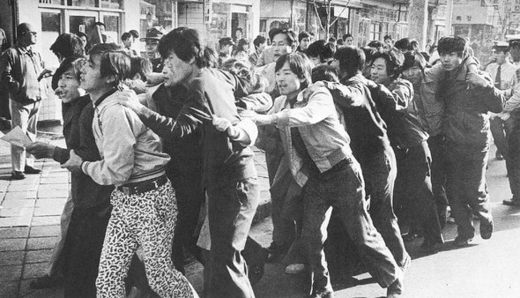 |
|
A group of college students took to the street in 1974, demanding that the Yusin Constitution be abolished.
|
Several remember feeling shame at their rulings, others say they remember nothing
Some judges accused of having ruled against pro-democracy activists in the 1970s say they feel shameful over their past rulings; others, however, say they do not remember handing out the verdicts, or had merely ruled in line with laws at that time. The Hankyoreh obtained a list of 492 judges involved in 1,412 cases related to then-president Park Chung-hee’s so-called "Emergency Measures," used as a means to brutally squelch dissent. The Hankyoreh then gathered opinions from 45 among them who could be contacted. The Emergency Measures were made possible through Park Chung-hee’s 1972 Yusin Constitution, which also essentially guaranteed him unlimited presidential office. The measures, in the name of national security and civil order, placed restrictions on the fundamental rights of citizens, including assembly, association, and freedoms of speech and the press. The 1st Emergency Measures prohibited anyone to mention anything regarding the Yusin Constitution, and the 4th set of measures, announced in April of the same year, meted out punishment to those with ties to a student dissident group, callled the National Young Students’ Alliance for Democracy (Min Cheong Hak Nyeon). The 9th set of measures, announced in May 1975, also allowed no freedom whatsoever to disparage or even discuss the circumstances surrounding the establisment of the Yusin Constitution. Mr. Lee, a lawyer who was a judge at a higher court during the time period in question, said, "Whenever cases came before me related to the Emergency Measures, I felt a burden in my heart. At that time, I had no choice but to rule [in accordance with the law]. Whenever I look back on the past, my heart bleeds, but that was our responsibility."Another lawyer, who was a judge for the Constitutional Court at the time, said, "I was in agony whenever I took a case related to the Emergency Measures. I fell into mental conflict about whether to resign. I had tried to acquit students and citizens who were arrested for violating the law. But if that proved impossible, I had no choice but to rule [against them]." However, Gwon Nam-hyeok, current chief of Busan’s higher court, said he cannot remember his rulings from the time. In 1978, he was one of the judges presiding over the trial of a fisherman, who was arrested for speaking ill of then-President Park Chung-hee. The sentence was two years in prison. "[Though I can’t remember], at that time, I ruled in line with the law," Gwon said. "At that time, nobody, including media, parliament, civic groups, and lawyers, could talk. I don’t understand whey they are trying to reassess that period now." In 1977, Kim Jin-gi, now head of Daegu’s higher court, was one of the judges in a trial that gave a one-year prison term to then-lawmaker Seo-Yeong-su on charges of violating the Emergency Measures. However, Kim said he cannot remember the defendent’s name, nor the ruling itself. "I think I seemed to have ruled on the case...I didn’t think the Emergency Measures were bad, but neither did I think they were necessary. At that time, I was young and just an associate judge, and I think I [must have] ruled in line with the law." Lee Ho-won, chief of Seoul’s home court, said, "I had been a judge for the military courts, but I have no memory about rulings related to the Emergency Measures." In 1978, Lee was one of the judges that handed a two-year jail sentence to a soldier who was arrested for discussing the dictatorial nature of Park Chung-hee’s regime. After tracking the promotion records of the 492 judges, the Hankyoreh found that, following the period in question, many of them ascended to top posts at local courts. Twelve are still serving in such top posts. Four are current justices at the Supreme Court, and two are currently at the Constitutional Court. Some of the judges were contacted by The Hankyoreh, but refused to comment on the rulings in question, saying through their secretaries that they had "no comment," or that they thought it "inappropriate to talk to a reporter regarding these issues." Of the 492 judges, 101 have retired after having served as the chief of a court or in another high position. Please direct questions or comments to [englishhani@hani.co.kr]






